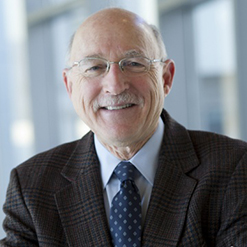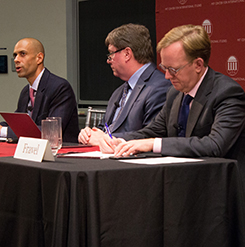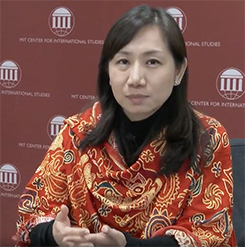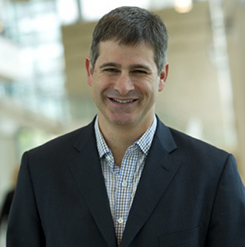New initiative supported by $3.7 million in grants
Resource Development
First published here.
The MIT Security Studies Program at the Center for International Studies in the School of Humanities, Arts, and Social Sciences, and Harvard Kennedy School’s Belfer Center for Science and International Affairs launched today a collaborative program to mentor the next generation of foreign policy scholars. The Project on Grand Strategy, Security, and Statecraft is made possible with support from the Charles Koch Foundation: a $1,846,200 grant to MIT and one for $1,853,900 to Harvard Kennedy School (HKS).

Barry Posen, Ford International Professor of Political Science and director of the Security Studies Program, will jointly direct the MIT-Harvard program, which will provide pre- or postdoctoral fellowships to young scholars from a variety of disciplines working in the broad area of strategy and statecraft, with particular emphasis on the US and its role in the world.
The Security Studies Program and the Belfer Center have a long-standing commitment to training security experts and publishing relevant research. Fellows in the Project on Grand Strategy, Security, and Statecraft will each spend one year at MIT and one year at Harvard—providing an introduction to the senior security scholars, visitors, and graduate students at both institutions. A joint speaker series will further cement the cooperation between the two programs. MIT will also host visiting scholars from the policy community to better connect scholarship to statecraft.
“So long as there is no world government to protect states from each other,” explains Barry Posen, Ford International Professor of Political Science and director of the MIT Security Studies Program, “conflicts of interest will occur and governments will compete for power and influence. Military force is one tool of this competition. In this environment, the United States and other major powers must mobilize different capabilities and devise effective strategies to protect their home territory and other vital interests, but without jeopardizing their long-term prosperity or compromising core political values.”
“The fellows program will build a community of scholars dedicated to fundamental research on the most critical security problems of our time, and to bringing the fruits of that research to public policy,” Posen continues. “We greatly appreciate the contribution of the Charles Koch Foundation to this important endeavor, and the foundation’s recognition of the enduring importance of security scholarship.”
According to Stephen Walt, Harvard Kennedy School’s Robert and Renée Belfer Professor of International Affairs Kennedy School, “States are more likely to make sound strategic choices and learn from past mistakes if there is a well-informed and wide-ranging debate on these issues. A healthy democracy therefore requires a diverse and well-trained community of independent experts who understand strategy, security, and statecraft and whose work can inform elites and public debates on foreign policy, and especially decisions to use force. Military force and other instruments of national power may be essential to preserving national security, but understanding the limits of armed force and the complex consequences that accompany its use is equally important.”
“The country is in a critical period of self-reflection about its proper role in the world and how the US can best meet its security needs going forward,” said Charles Koch Foundation Vice President William Ruger. “We are excited to support Harvard and MIT’s world-class vision for engaging the next generation of foreign policy scholars as they develop the research and ideas that will inform this discussion.”
In addition, the foundation grants will support the research of graduate students in security studies at both institutions. Taken together, these features of the Project on Grand Strategy, Security, and Statecraft will significantly enhance the connection of the academy to foreign and security policy, and broaden the national security debate to include a more diverse set of views. The Charles Koch Foundation has made similar grants or awards to schools including Notre Dame, Tufts University, the University of California at San Diego, and other prestigious institutions.
Nuclear and present danger
Peter Dizikes, MIT News Office
First published here.
Rising tensions between the US and North Korea have an unsettling chance of escalating, MIT security experts said at a public forum on Tuesday—but are also manageable given the right approach by US leaders.

Left to right: Vipin Narang, associate professor of political science and a member of the Security Studies Program; Jim Walsh, senior research associate at the Security Studies Program; and Taylor Fravel, associate professor of political science, a member of the Security Studies Program, and acting director of the MIT Center for International Studies. Watch the video.
“I think you can get inadvertent war,” said Jim Walsh, a senior research associate in MIT’s Security Studies Program (SSP) and a nuclear security expert who has visited North Korea in the past. “It’s still an unlikely event,” he added. However, he also stated, “I would remind you that improbable events do happen. … I am more worried than I have been before.”
To keep the situation under control, the panel of three nuclear-security scholars said, the US would do well to seek further diplomatic talks with North Korea. The US should also reconcile itself to the fact that North Korea does have nuclear weapons and, for a variety of reasons, it must not expect China to address the situation decisively.
“We should certainly be talking to them,” said Walsh, who, like others on the panel, believes that North Korea’s nuclear capacity is almost certainly here to stay.
“The bad news is that denuclearization is a fantasy,” said Vipin Narang, an associate professor of political science at MIT, who has written extensively about North Korea’s nuclear program and gave a summary of the country’s current capabilities. “The good news is, deterrence can work.”
Meanwhile China—who some US leaders, including President Donald J Trump, have sometimes cited as a key actor in this scenario, given its political alignment with North Korea—seems unwilling to play a larger role in the current state of affairs.
“I think China believes that the North Koreans are developing nuclear weapons for perfectly [logical] reasons,” said Taylor Fravel, an associate professor of political science at MIT and interim director of MIT’s Center for International Studies (CIS). Fravel, a leading expert on China’s foreign-policy conflicts, added that Chinese leaders, who maintain their own nuclear arsenal, likely view North Korea’s weapons as “an insurance policy, one they [China] can see in their own history.”
The event drew a crowd of at least 225 people, packing a lecture hall in MIT’s Building 34. The three panelists all delivered prepared remarks and responded to a series of audience questions. The discussion was part of the CIS Starr Forum, a series of public discussions on world politics.
North Korea: New arsenal, familiar strategy
Narang gave the audience an overview of which types of missiles and nuclear payloads North Korea has developed, based on the best public knowledge available. North Korean leader Kim Jong Un has publicly announced a lengthy series of tests over the course of 2017.
“He acquired nuclear weapons to avoid a US-led regime change,” Narang said, adding that the North Korean strategy is “risky, but it’s not irrational.”
Indeed, Narang emphasized, the North Korean nuclear strategy is precisely the same one used by Pakistan and, to a large degree, NATO forces during the Cold War. North Korea has seemingly developed short-range missiles capable of delivering nuclear bombs, and as of this summer, an intercontinental ballistic missile (ICBM) capable of reaching North America.
Both types of missiles are necessary for North Korea to achieve a kind of mutual deterrence with the US, Narang pointed out. That is, if North Korea only had shorter-range missiles and used them to deliver a nuclear bomb in, for instance, a conflict with South Korea, then South Korea’s allies—namely, the US—could respond by essentially wiping out North Korea in retaliation.
However, the presence of North Korean ICBMs that could deliver nuclear weapons to North America stands as a deterrent to such a US reply, hypothetically.
Journalist from China joins CIS as the Elizabeth Neuffer Fellow
First published here.
Audrey Jiajia Li, a freelance journalist and independent filmmaker based in Guangzhou, China, has been selected as the 2017 International Women’s Media Foundation (IWMF)/Elizabeth Neuffer Fellow. The fellowship provides a unique academic and professional opportunity for women journalists focusing on human rights and social justice reporting.

Chinese journalist Audrey Jiajia Li is using the Elizabeth Neuffer Fellowship to study the use of government propaganda on social media and its impact on the rise of ultra-nationalism in China. In this video interview, she draws parallels between the current climate of journalism in the US and journalism in China.
Li began her seven-month fellowship as a research associate in residence at the MIT Center for International Studies (CIS) while also interning at The Boston Globe. In the spring, she will move to New York and intern at the The New York Times. Li is pursuing coursework and projects to better understand the use of government propaganda on social media and its impact on the rise of ultra-nationalism in China.
Li covers current affairs in China, with a focus on politics, human rights, social justice, and freedom of speech. She first kicked off her career in journalism as a business news reporter in Shanghai, where she investigated cases of human rights violations resulting from China’s rapid economic growth. She produced and hosted an award-winning, nationally-televised program for nearly two years, where she interviewed guests about sensitive political and human rights issues. Li was also selected by the US Department of State’s Media Co-op Program to create her documentary “LA, Say Goodbye to Smog,” to inform her Chinese audience about the importance of civic engagement.
Li has recently resigned from her position at an official TV station to become a freelance columnist and independent filmmaker.
“In my observation, two real Chinas exist in parallel at the same time. One is a super power with rapid economic growth and a quick rise of living standards, while the other is a vast nation where a sizable number of people still suffer from inequality, injustice, and a lack of individual liberty. Journalists have the obligation to raise awareness about these important yet ignored issues to make my country a better place,” Li said.
The fellowship was created in memory of Elizabeth Neuffer, a correspondent for The Boston Globe and winner of the 1998 IWMF Courage in Journalism Award. Neuffer died while reporting in Iraq on May 9, 2003. In collaboration with Neuffer’s family and friends, the IWMF started this program to honor her legacy, while advancing her work in the fields of human rights and social justice.
MIT International Policy Lab (IPL) issues third call for proposals to faculty and researchers
Dan Pomeroy, IPL
First published here.
The MIT International Policy Lab (IPL), which helps leading MIT researchers develop the policy implications of their research and thus better inform the policymaking community in the United States and abroad, has issued its third call of proposals. The IPL provides funding and staff support for translating scholarly work into digestible, policy-relevant materials and for direct outreach to policymakers.

"Helping to connect the academic and policy communities is another way MIT can fulfill its mission of helping to solve the world's great challenges," said Chappell Lawson, associate professor of political science and faculty director of the IPL.
“We are very pleased with the success of this initiative so far,” said faculty director Chappell Lawson, associate professor of political science. “Solving the challenges facing our country and the world is central to MIT’s mission; better connecting MIT researchers and policymakers contributes to that goal. Engineers, scientists, and other scholars at MIT produce a great deal of research that has direct implications for policy, but it is not always in a form that helps policymakers know what to do tomorrow. We have found that many faculty members here want to have an impact on policy but don’t feel familiar enough with how the process works to do so efficiently. Helping to connect the academic and policy communities is another way MIT can fulfill its mission of helping to solve the world’s great challenges.
In its previous call for proposals, the IPL received applications and offered support for projects with faculty members from all five Schools, helping to translate and disseminate their research to policy audiences, soliciting feedback from policymakers, and providing funding for travel to policy-oriented meetings
Richard Samuels, Ford International Professor of Political Science and director of the Center for International Studies, said “We are delighted to be working with colleagues across the Institute to help extend the reach of their path breaking ideas to the policy world.”
Projects from faculty spanned a diverse set of topics, including energy and environment, international security and development, health and biology, and privacy issues.
“The IPL provides tremendous support for educating MIT faculty and researchers about how to think about the policy implications of their work,” said Elizabeth Wood, professor of Russian & Soviet history. “I personally benefited both from the special workshops that IPL held and also from Dan Pomeroy’s expert advice and editing as I was preparing materials to take to Washington and to an international meeting in Berlin.”
“With the support of IPL, I have been able to extend the reach of my research findings not only in the context of US policy, but also abroad,” said Elsa Olivetti, Atlantic Richfield Assistant Professor of Energy Studies in the Department of Materials Science and Engineering. “IPL’s prompt, professional, consistent support has been essential to my work, and I find they strike the perfect balance between offering constructive feedback and listening to where I feel the impact of my research will resonate most.”
“The IPL helped connect us to major players in the area of US-Russia nuclear security to discuss the technologies that we are developing here at MIT,” said Areg Danagoulian, Norman C. Rasmussen Professor of Nuclear Science and Engineering. “Given my non-policy background, the advice I received both directly from IPL and from the experts that the IPL connected me with was crucial to developing a strategic and efficient outreach plan.”
“The support of the IPL program and team has allowed for fantastic opportunities to identify partnerships in public health policy and to facilitate onset of new collaborations and outreach activities,” said Lydia Bourouiba, assistant professor of civil and environmental engineering, who studies respiratory disease transmission. In addition, IPL support has been particularly valuable for receiving feedback early in the process of translating scientific research results into policy recommendations.



